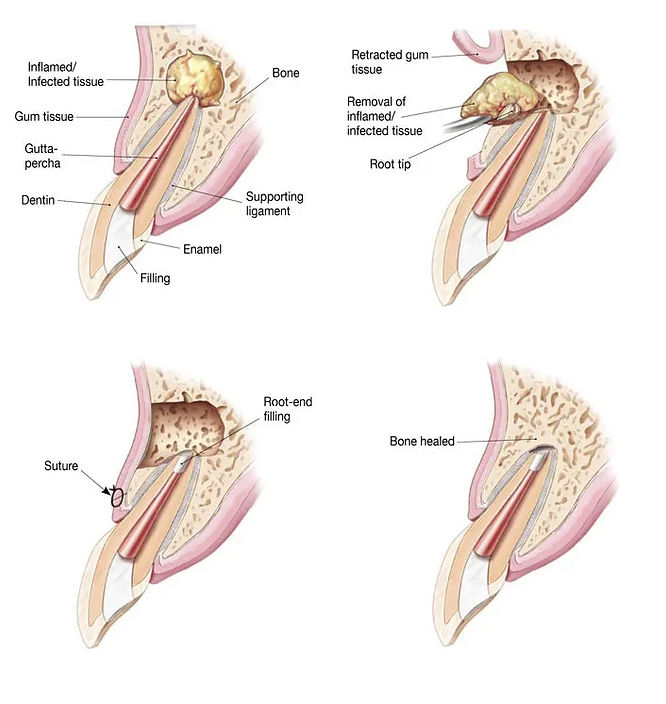Apical Surgery
Dental apical surgery, also known as apicoectomy or root-end surgery, is a specialized procedure performed by dentists or endodontists to address persistent root-end problems and save teeth that have undergone unsuccessful root canal treatments. This surgical approach targets the root tip (apex) of the tooth, where infections or inflammation may persist despite conventional root canal therapy.
The Purpose of Dental Apical Surgery:
Dental apical surgery aims to treat and resolve conditions affecting the root tip of a tooth, such as persistent infections, cysts, or abscesses. These issues can develop when bacteria or tissue remnants remain in the root canal system, leading to continued discomfort, inflammation, and potential damage to the surrounding bone. Apical surgery provides an opportunity to access and treat these root-end problems, eliminating the source of infection and promoting healing.
The Dental Apical Surgery Procedure:
-
Evaluation and Treatment Planning: Prior to dental apical surgery, a thorough examination of the tooth and its surrounding structures is conducted. X-rays and scans help assess the extent of the root-end problem and determine the need for surgical intervention. Based on the evaluation, the dentist or endodontist will develop a personalized treatment plan.
-
Local Anesthesia: To ensure patient comfort during the procedure, a local anesthetic is administered to numb the surgical area. This helps to alleviate any potential pain or discomfort.
-
Accessing the Root Tip: The dentist or endodontist creates a small incision in the gum tissue near the affected tooth, exposing the underlying bone. The bone may be gently trimmed or removed to access the root tip and surrounding area.
-
Root-End Resection: The root tip, or apex, of the tooth is carefully examined, and any infected or damaged tissue is removed. In some cases, a small portion of the root is also resected to ensure complete removal of the problem area.
-
Cleaning and Sealing: After the resection, the root canal is thoroughly cleaned and disinfected to remove any remaining bacteria or debris. A biocompatible material, such as a dental filling material called gutta-percha, is then placed to seal the root canal and prevent further infection.
-
Suturing and Healing: The gum tissue is carefully sutured back into place, promoting proper healing of the surgical site. Over time, the gum tissue regenerates, and the bone surrounding the treated tooth repairs itself.
Benefits of Dental Apical Surgery:
-
Preservation of Natural Teeth: Dental apical surgery is a conservative approach to treating persistent root-end problems, allowing for the preservation of natural teeth that might otherwise require extraction.
-
Elimination of Infections and Inflammation: By accessing the root tip and removing infected or inflamed tissue, apical surgery eliminates the source of infection and promotes healing. This can alleviate pain, discomfort, and swelling associated with root-end problems.
-
Restoration of Oral Health: Dental apical surgery contributes to overall oral health by resolving persistent root-end issues. Successful treatment reduces the risk of further infection or complications, ensuring a healthier oral environment.
-
Improved Longevity of the Tooth: Apical surgery, combined with proper oral hygiene and regular dental care, can extend the lifespan of the treated tooth. This allows for continued functionality and aesthetics, avoiding the need for costly tooth replacements.
Dental apical surgery is a specialized procedure designed to address persistent root-end problems and preserve natural teeth. By accessing the root tip, removing infected or inflamed tissue, and sealing the root canal, this surgical approach promotes healing, eliminates infections, and restores oral health. If you are experiencing ongoing discomfort or have been told that a root canal treatment has been unsuccessful, consult with Doctor Aykut to explore the possibility of dental apical surgery as a solution to your dental concerns.

